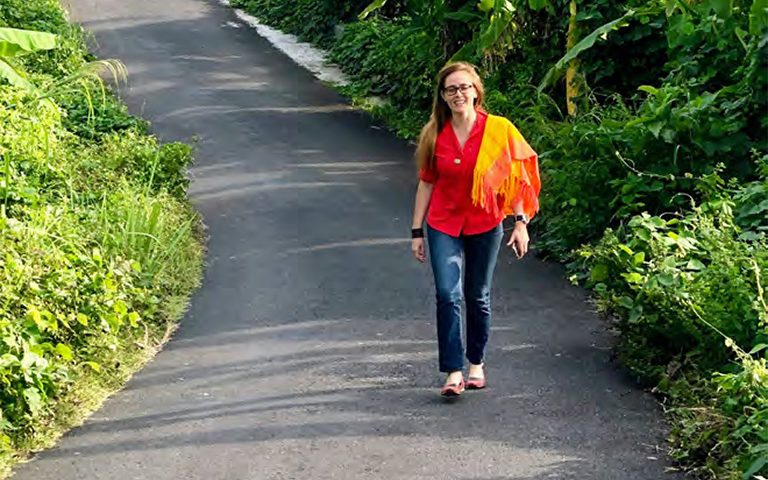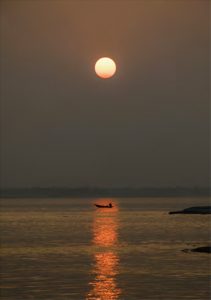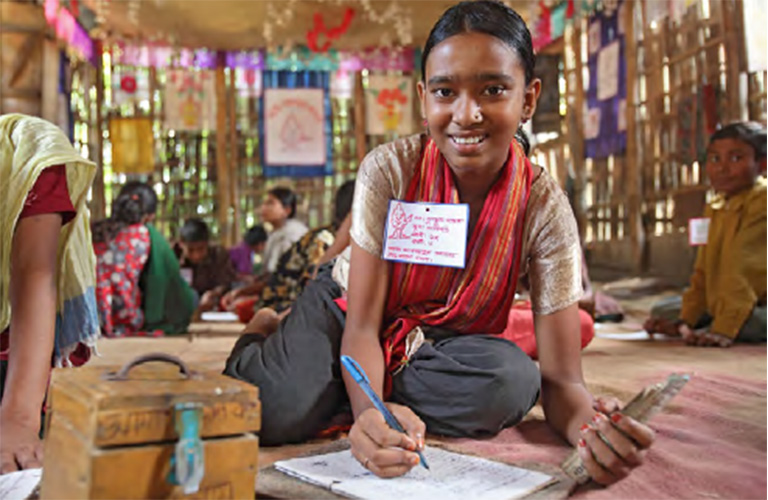Spending my 20s in Bangladesh: Journal of a young Aussie

Will the torchbearers of tomorrow even have a torch?
April 2, 2019
Interview: Dr Muhammad Musa
April 9, 2019Spending my 20s in Bangladesh: Journal of a young Aussie

I have spent most of my 20s in Bangladesh.
It was not a path I took by choice. I love Australia, but I grew up on a boat with gypsy sailor parents and inherited itchy feet. My mother left home on the back of a motorbike before she was 18 and ended up as a rock journalist in London, modelling in Malaysia, and starting a resort on an island in Thailand. My dad’s first job out of school was sailing from Singapore to San Francisco. He had a 9-5 job while I was growing up, but it was to jump crocodiles and handle snakes. My earliest days were spent on a sailing safari where he taught scuba diving and pro fishing.
My parents always had a story.
While I still find myself on some days wondering why I live here – like when I am stuck in a deafening traffic jam on a day where the stench of the drains is almost enough to knock someone out – the Dhaka jam keeps me coming back. The country of a dollar and a dream, where anything happens. Dhaka isn’t a poverty lab on the other side of the world speculating on “developing” countries; it’s the frontline of some of the world’s biggest challenges: climate change, environmental pollution, and workers’ struggles. It’s gritty, grimy and real. It’s a place that has accepted almost a million refugees in the last 18 months, where I personally watched some of the poorest people I’ve ever met give the clothes off their own backs to complete strangers.
As I am writing this I am listening to construction workers hurling materials around building sites, steel rods crashing on the ground because they are being dropped instead of using lowering equipment, no one wearing safety gear, in the middle of the night. At the same time I cannot help but be entranced by the soft notes of a lone flute player wandering the streets playing a folk tune.
Bangladesh is a country of contrasts. Today you are stuck in unimaginable bureaucracy and tomorrow you are getting things delivered at an unimaginable speed. No work orders, no quotes, no straight lines – just hustle, before they would have had time to open the paperwork at home.
It’s a place where things happen.
I grew up reading Enid Blyton – The Secret Seven, The Famous Five, and The Adventures of Huckleberry Finn and Tom Sawyer – and my only dream was to have adventures. Bangladesh is that for me. Every day, without fail – and without choice – is an adventure. There’s always a festival, a celebration, a strike, some human chain, a protest, a show. It’s a flood of humanity that gets into every pore.
Spending a large part of my 20s here has been an experience.
A huge worldview
One of my first feelings when I arrived here was embarrassment. I just did not have the knowledge of history, global politics, geography, literature, music and poetry, or the academic background of so many people I met. I did not even know where Bangladesh was before I came here. But every person I met knew Australia – and generally a little about its heritage and gruesome history. I come from an island – albeit a large one – but it had never occurred to me how much influence that had on me until I left its shores. It still shocks me when I go home, when the things I generally discuss with friends in Bangladesh, such as Yemen, or the plight of the Rohingya community, are “those issues”.
Bangladeshis are generally curious. They do not necessarily want to permanently move outside of the country, but travel because they are curious about how others live. One of the sweetest things I hear every day is people trying to speak English. Interestingly, this is not usually a second language either. A lot of content on television is in Hindi, and most students learn Arabic in school and often some Urdu along the way. So English is a fourth or fifth language.

Equally huge limitations
I was the first in my family to get a university degree, and I still do not have a Master’s degree – and that has never presented a barrier. We start working when we are still in school, and a lot of people do not continue from school into university. You can make as much or more money in blue collar jobs. If you do get a Bachelor’s degree, you work for a few years before thinking about further studies. Nobody asks about what school you went to, or what qualifications you have. People are not treated differently depending on it, or depending on their age. There is very little power difference. The CEO will often be the person at the back wearing the least fancy clothes, and they will introduce themselves last.
The respect for age and for hierarchy affects everything in Bangladesh. The power distance is even enshrined into the language (apni, tumi, etc). There is a head table with large bunches of flowers wrapped in plastic at every event, a protocol guideline needed to distinguish between chief guests and special guests, and a concept called a VVIP exists. There is a definite hierarchy on the road as traffic is stopped for a few minutes due to VVIP movement. Everyone who can hire house help does, and it is completely normal for those people to eat at separate times, in a separate place, and even with separate dishes, even though they are living in the same house as the people who pay their wages. The constant deference is seen as respectful, and definitely promotes social cohesion. But in my opinion, respect should apply more to helping people across a road or deciding who gets served first at the dinner table.
The barriers are just as stark for young people wanting to leave the country. It is of course clichéd, but I had never really thought about privilege. For example, visas. I booked holidays a few days before I wanted to go, and I had never imagined that there was any part of the world where, if I had the money, I would not be able to visit. When I went with two Bangladeshi friends, Kanak Aditya and Muntasir Mamun, to cycle across Canada and Alaska, I had to experience days of waiting in lines with them. The questions they had to face when we crossed the border into the US, and then getting stopped by police in a park because Muntasir had his hands in his jacket pockets (because they were freezing!), the experience had as much impact on me as the three-month cycling trip. I had always taken the Aussie rite of passage for granted; a ski season in Canada, a year abroad working in an entry-level job in the UK, a Eurotrip, sightseeing in New York and visiting American friends I met in Australia and the beaches of Thailand and Bali. A stark difference to my friend who flinches at my holiday pictures of France because he has been invited to Europe so many times to speak at conferences or run workshops, but has now completely given up because his visa has prevented it every time.
Young people in Bangladesh have a lot to say but are limited in where they are saying it – both within the country and outside of it.
Getting outdoors
So many people here can do so much. All my friends in Bangladesh can sing, play an instrument, have at least one Master’s degree, and write poetry. My friends at home are just as talented. But we choose to spend our time in different ways. In Australia, kids cannot stay inside if the sun is out. Or if it’s not. Rain, hail, or shine we are out. Everyone has a skateboard, a bike, a tent and a swag. It’s like a how-to-be-an-Aussie starter kit. It’s unfathomable if you don’t go camping every two weeks, a road trip once a month, a bushwalk every other week. We mostly all live on the coast, or near water, and no one is very far from a wild place. You spend every weekend in a forest somewhere. Then when you start travelling, you explore forests and hiking trails and beaches. You see the world through maps, binoculars, with bare feet and a backpack.
It was such a shock to meet people who could write beautiful poetry but who had never changed a tyre.
In Australia it’s lived. It’s not a concept, a place to visit, something that you can choose to enter and leave – wild places are everything. There is no end and no beginning. It’s home. The respect comes inherent because it feels like your house. Throwing rubbish is disrespecting yourself.
I feel as if there is a beauty in both. Both reading and writing, and adventures, build empathy. Young people need to be able to access both books and nature.
There is also something which is uncannily similar – Australia is a country which has been built by hands. It is unrelenting, angry, harsh, scary, and untameable. The rain buckets from the sky in Northern Australia, and floods every road in the same way as it does here. The nor’westers, or kal boishakhis, sweep up entire towns and stop everyone living in them in their tracks for that hour or so. The best shows in the entire country are in the sky during monsoon, when we spend months mesmerised and terrified about whether the storms will turn into a cyclone. The strong self of self-identity in Bangladesh because of the struggle of building the country by hand is changing fast though. That is not life anymore – they are now childhood memories, realities only for parents, not for young people who have grown up surrounded instead by the fruits of that struggle. Instead of boats and hardship, and swashbuckling adventures, they have smartphones and boredom – and loneliness. The roads are still referred to as rasta ghat, but there is a lot more rasta and a lot less ghat in Bangladesh’s cities.
Oh Bangladesh!
 Living here is being enveloped by what sometimes seems like a whole universe of traditions, beliefs and tiny symbols that all have so much history. People do have traditions and culture at home, but it’s something you need to search out and opt into. In Bangladesh, there is no opt-out button. You are immersed in it, all of the time. It affects everything – from office timing, to traffic, to the type of food available in the market and what you need to have in your wardrobe. There is a government department that monitors moon activity to decide on public holidays.
Living here is being enveloped by what sometimes seems like a whole universe of traditions, beliefs and tiny symbols that all have so much history. People do have traditions and culture at home, but it’s something you need to search out and opt into. In Bangladesh, there is no opt-out button. You are immersed in it, all of the time. It affects everything – from office timing, to traffic, to the type of food available in the market and what you need to have in your wardrobe. There is a government department that monitors moon activity to decide on public holidays.
Never at home would I walk into the office in the morning feeling like I have tackled a war zone by 8am, and then walk out at the end of the day reinvigorated by hundreds moving in procession throwing dye, singing in broad daylight, dancing and everyone wearing costumes – even men dancing – and no one is intoxicated. See women in the most incredibly coloured sarees walking past roads where mass animal slaughtering has just taken place, with the blood lining the drains matching the scarlet red ties on the back of their blouses. Smell the intoxicatingly sweet fragrance of jasmine worn in strings around wrists colliding with the sick, smothering odour of death. Women running Parliament but not always safe on the streets.
It’s the little things, like the jingle of the locksmith walking house to house every morning to ply his trade, the pure bliss of sitting in a tea stall overlooking Kaptai Lake and watching the sun go down, and watching a woman openly slap a man in the face, the way that you can walk into anyone’s house in a village and ask to use a bathroom and they will not only welcome you in, but you will end up having lunch with them as well.
The sacred and the profane, colliding every single day. Life -in all its complexities and contradictions, all up in your face.
Bangladesh is an incredible place to be young. I could not have planned my own story better if I had tried.
Disclaimers: This is a Dhaka and Darwin-centric opinion, and only representative of my personal experience. I’ve lived in and out of Bangladesh since 2011, primarily working with the United Nations, and been permanently based in Bangladesh for the last three years with BRAC.
Sarah-Jane Saltmarsh is the head of programme and enterprise communications at BRAC Communications.

